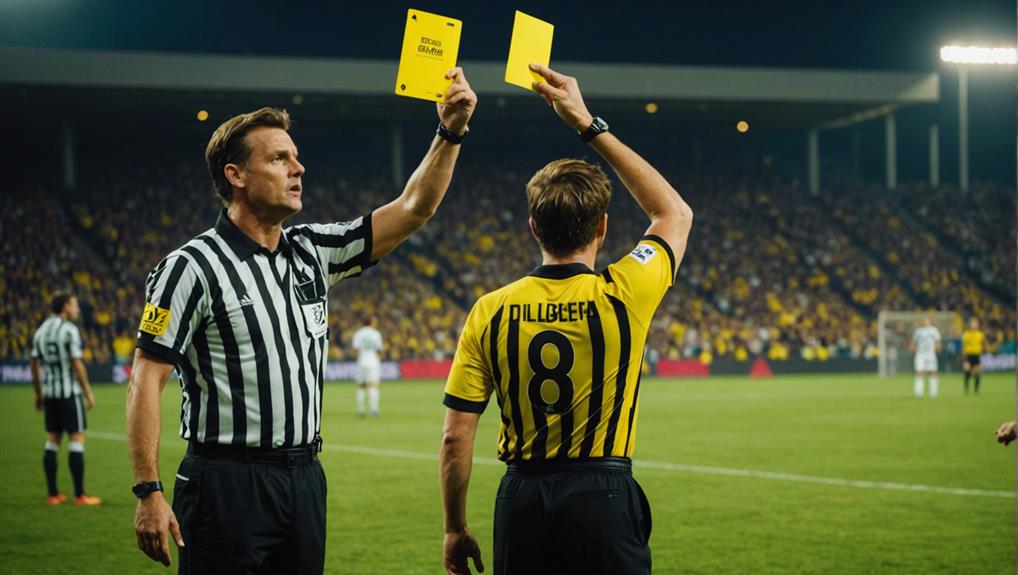
Significance of a Yellow Card in Soccer
April 27, 2024In soccer, a yellow card warns you about misconduct, helping maintain order and fairness on the field. It signals a disciplinary caution for unsporting behavior or dissent, emphasizing respect for the game. Accumulating yellow cards can have significant consequences, impacting gameplay strategies. Referees play an important role in enforcing these warnings for player conduct. Understanding the significance of a yellow card is essential for staying disciplined and avoiding suspensions. This initial insight provides a glimpse into the intricate role of yellow cards in soccer matches.
Importance of Yellow Card
The yellow card in soccer plays a pivotal role in maintaining order on the field by formally cautioning players or team officials for misconduct. When a player receives a yellow card, it serves as a disciplinary warning, signaling that their behavior is unacceptable. Referees use yellow cards to manage player conduct during soccer matches, ensuring fair play and sportsmanship. These formal cautions are essential for enforcing disciplinary actions and upholding the rules of the game.
For a player, a yellow card is a serious matter as it can lead to further consequences. If a player accumulates two yellow cards in the same game, they receive a red card, leading to their suspension from the match. This suspension can have significant implications for both the player and their team, impacting their performance on the field. Players must be mindful of their actions to avoid receiving multiple yellow cards and facing disciplinary sanctions. The yellow card system acts as a deterrent against misconduct, promoting a respectful and competitive environment in soccer.
Disciplinary Warning in Soccer
In soccer, a yellow card serves as an important signal of caution for players' behavior during a match. When a player commits a cautionable offense like unsporting behavior or dissent, the referee may issue a yellow card as a disciplinary warning. This warning is a way for the referee to communicate that the player's actions are unacceptable and need to improve to maintain fair play on the field.
The yellow card is recorded by the referee, and if a player accumulates multiple yellow cards, it can lead to more severe consequences, such as receiving a red card and being ejected from the game. Getting a yellow card should serve as a wake-up call for the player to adjust their behavior and adhere to the rules to avoid further penalties.
Ultimately, the purpose of the yellow card is to make sure that players understand the importance of fair play and respect for the game's regulations.
Caution for Player Behavior

Issuing a yellow card during a soccer match serves as a clear warning to players regarding their on-field behavior. When a player commits a foul or engages in unsporting behavior, the referee may show a yellow card as a cautionary measure. This formal disciplinary action indicates that the player's actions are unacceptable and need to improve for fair play to continue. The player receiving the yellow card can remain on the field, but it serves as a reminder to adhere to the rules and regulations of the game.
The yellow card system helps maintain discipline and integrity within the game, ensuring that players respect the sport and their opponents. It acts as a deterrent, discouraging players from repeating similar offenses. If a player accumulates a second yellow card during the same match, it results in a red card and subsequent ejection from the game. Players must heed the caution of a yellow card to avoid further consequences and uphold the spirit of fair play on the field.
Impact of Yellow Card on Gameplay
Receiving a yellow card in soccer can greatly influence how you approach the game and make decisions on the field. The caution serves as a warning for player misconduct, impacting gameplay greatly.
When a player receives a yellow card, it often prompts a shift in tactics and decision-making to avoid a potential red card. You must now be more cautious in your challenges and interactions to prevent further disciplinary action.
The fear of accumulating more yellow cards can lead to suspensions, affecting team dynamics and strategy in upcoming matches. This disciplinary measure not only affects individual players but also the overall gameplay, as the threat of a yellow card can alter the flow of the game by promoting fair play and keeping players in check.
Therefore, staying mindful of your behavior and actions on the field is essential to maintaining a competitive edge while upholding the principles of fair play.
Yellow Card System Overview

When considering the yellow card system in soccer, it's important to understand its purpose in cautioning players for misconduct.
Accumulating yellow cards can have significant consequences, potentially leading to player suspensions.
Referees play a key role in decision-making when issuing yellow cards during a match.
Yellow Card Purpose
The yellow card in soccer serves as a clear and formal caution for player or team official misconduct while providing a chance for the individual to rectify their behavior. It acts as a warning for unsporting behavior, signaling to the player that their actions aren't acceptable.
Referees make a note of the details of the offense in a small notebook when issuing a yellow card. If a player receives a second yellow card in the same game, it results in a red card and player ejection.
This system aims to enhance clarity and effectiveness in disciplinary actions on the field, ensuring that players understand the consequences of their behavior while maintaining fairness and order during the game.
Player Consequences
Player consequences for accumulating yellow cards in soccer can result in match suspensions depending on the tournament or league rules. When a player receives two yellow cards in a game, they're shown a red card and face suspension for the next match.
The duration of suspension for accumulating yellow cards varies based on competition regulations. It's important for players to be cautious to avoid future match suspensions due to accumulating yellow cards.
The specific consequences of accumulating yellow cards are outlined in the competition or league rules. Hence, players need to be aware of the potential repercussions of receiving multiple yellow cards within the same competition to prevent facing further disciplinary actions.
Referee Decision-making
How does the referee's decision-making impact the implementation of the Yellow Card System in soccer? Referees play an important role in enforcing player conduct through the yellow card system. Their swift judgment can influence the flow of the game greatly.
Here are some key points to keep in mind:
- Referees caution players for unsporting behavior and dissent with a yellow card.
- A second yellow card results in a red card and the player's ejection.
- Details of the offense are recorded in a small notebook for reference.
- Accumulated yellow cards can lead to suspensions for players.
- Referees manage player conduct effectively by using the yellow card system.
Player Accountability and Fairness

Promoting accountability and fairness on the soccer field, yellow cards serve as an indispensable tool for maintaining sportsmanship and enforcing rules. When players receive yellow cards, they're given a warning to adjust their behavior and adhere to the standards of fair play. This accountability mechanism guarantees that all players are held responsible for their actions during the game. By penalizing misconduct and unsporting behavior, yellow cards help uphold the integrity of the match. Players must recognize the consequences of their actions and make the necessary adjustments to avoid further disciplinary action.
The consistent application of yellow cards is vital in ensuring a level playing field where all participants are expected to conduct themselves appropriately. This consistency fosters an environment where fairness and sportsmanship are prioritized, creating a more enjoyable experience for everyone involved. Ultimately, player accountability through yellow cards is a fundamental aspect of upholding the principles of fair play in soccer.
Red Card Consequences
Discussing the consequences of receiving a red card in soccer involves understanding the immediate impact on the game and the subsequent repercussions for the player and their team. When a player receives a red card, they face immediate ejection from the game, leaving their team at a numerical disadvantage. The consequences extend beyond the match, as red-carded players typically face suspensions from future games. Red cards are often a result of serious fouls, violent conduct, or denying a goal-scoring opportunity, impacting not only the player but also the team's performance and strategy.
Here are some key points to take into account:
- Immediate ejection from the game
- Suspension from future matches
- Red cards usually issued for serious fouls or violent conduct
- Teams play with a numerical disadvantage
- Consequences impact the team's performance and strategy
Understanding the implications of a red card is vital for players and teams to navigate the challenges it presents effectively.
Maintaining Discipline on the Field

You must understand the expectations regarding your behavior as a player on the field to avoid disciplinary actions like yellow cards.
Referees hold the authority to make decisions to uphold order and fairness during the game.
Respecting their decisions guarantees a smooth and competitive match for all.
Player Behavior Expectations
Maintaining discipline on the soccer field is vital for you to avoid receiving yellow cards. To guarantee you stay on the pitch and contribute effectively to your team's success, here are some key player behavior expectations to keep in mind:
- Yellow cards: Serve as warnings for unsporting behavior or repeated rules infringements.
- Discipline: Essential for staying on the field and avoiding player suspensions.
- Warnings: Alert you to adjust your behavior to adhere to the rules.
- Team success: Requires disciplined player behavior to perform at your best.
- Rules adherence: Helps you steer clear of disciplinary actions like yellow cards.
Referee Authority and Decisions
To better understand the implications of referee decisions on the field, consider the authority they hold in enforcing discipline through actions like issuing yellow cards. Referees wield significant power in maintaining discipline, using yellow cards to curb unsporting behavior, dissent, and other infractions.
These cards play an important role in upholding fair play and sportsmanship during soccer matches. Players must adhere to the rules to avoid receiving yellow cards, which can lead to a red card and subsequent ejection from the game. Referees carefully assess player conduct, the seriousness of the offense, and the overall atmosphere on the field before brandishing a yellow card, emphasizing the importance of discipline and respect for the game's integrity.
Role of Referee in Issuing Yellow Cards
When it comes to issuing yellow cards in soccer, the referee plays an important role in managing player behavior on the field. The referee uses yellow cards to caution players for unsporting behavior, dissent, or repeated rule violations.
Here are some key points about the role of the referee in issuing yellow cards:
- Yellow cards serve as a warning to players and team officials regarding their conduct during the game.
- Referees note the time, offense details, and player information in a small notebook when issuing a yellow card.
- Players who receive a yellow card can continue playing but are at risk of receiving a red card for a second caution in the same match.
- Yellow cards are a tool referees use to manage player behavior and maintain order on the field.
- It's essential for referees to apply yellow cards consistently to promote fair play and uphold the spirit of the game.
Conclusion
As a soccer player, receiving a yellow card can make or break the game for you and your team. It serves as a crucial warning, reminding you to stay disciplined and avoid reckless behavior on the field.
The consequences of a yellow card can change the course of the game, highlighting the importance of player accountability and fair play.
So next time you step onto the field, remember the significance of that yellow card waving in the air.


